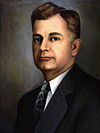Louisiana gubernatorial election, 1940
|
|
|||||||||||||||||
|---|---|---|---|---|---|---|---|---|---|---|---|---|---|---|---|---|---|
|
|||||||||||||||||
|
|||||||||||||||||
|
|||||||||||||||||
The Louisiana gubernatorial election of 1940 was held in two rounds on January 16 and February 20, 1940. Like most Southern states between the Reconstruction Era and the Civil Rights Movement, Louisiana's Republican Party was virtually nonexistent in terms of electoral support. This meant that the two Democratic Party primaries held on these dates were the real contest over who would be governor. The election resulted in the defeat of Earl K. Long and the election of Sam H. Jones as governor of Louisiana on a reform platform.
The focus of the campaign was the ongoing 'Louisiana Scandals' which implicated former governor Richard W. Leche – and by extension Earl K. Long – in widespread corruption. Jones's main campaign focus was a moralistic crusade against corruption, and the state's newspapers featured him in overwhelmingly positive coverage. Behind the scenes, though, Jones enlisted the aid of veteran politicos who were themselves implicated in questionable dealings. He refused to criticize Huey Long, saying that "I am not running against a dead man. I am running against a gang of rascals as live as any gang that ever lived, and I'm running to clean out every one of them." Jones also promised to expand some of the Long programs, including teacher salary increases and a new old-age pension.
Earl Long made use of the Louisiana Progress newspaper he had inherited from his brother, as well as state publications like the Louisiana Conservation Review. He also made extensive speaking tours throughout the state's rural areas, making colorful attacks on the big-city newspapers and calling Jones a tool of corporate interests.
...
Wikipedia


